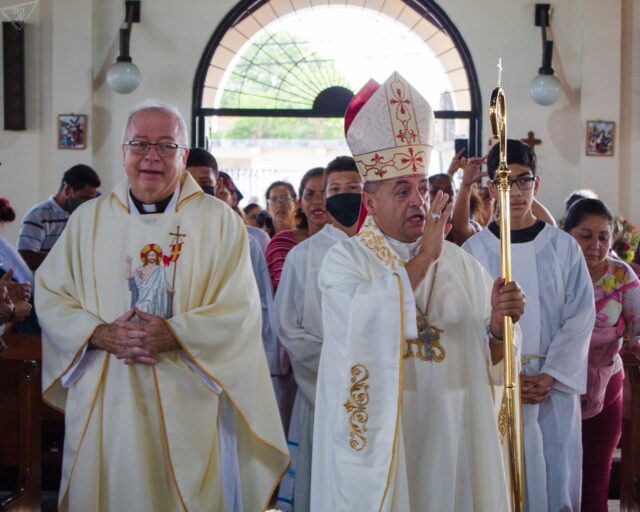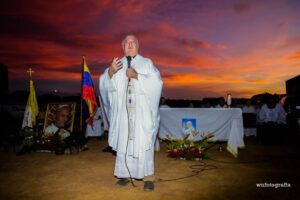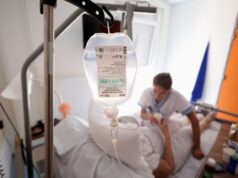
ST. PAUL, Minnesota — Many elderly and vulnerable Venezuelans living near the Jesucristo Resucitado mission parish in Ciudad Guayana couldn’t flee with their loved ones from the distressed South American country during its recent wave of emigration.
Now, they struggle to survive, not only lacking food and care, but hope, said Father Greg Schaffer, 60, a priest of the Archdiocese of St. Paul and Minneapolis who has served at the archdiocese’s mission in Venezuela for 28 years.
The native of St. Paul’s East Side estimated that 85% of Venezuelans may now experience hunger. A quarter of the population, mostly younger people, have left the country seeking better living conditions and up to this point, few have been sending money back to Venezuela, Father Schaffer said.
Amid this hardship, Father Schaffer continues to bring hope through the sacraments and, as much as possible, material assistance.
“The people really need hope,” he said, noting that with unemployment at 73% in the northeastern port city, domestic violence, delinquency, malnutrition, alcoholism and prostitution are growing problems for its almost 1 million residents. With continued currency devaluation, they can’t live on their pensions, Father Schaffer said.
“They come (to the mission), they turn to their faith for hope,” he told The Catholic Spirit, the news outlet of the Archdiocese of St. Paul and Minneapolis. While 90% of Venezuelans are Catholic, a sizable percentage do not practice the faith and the mission’s social programs bring Christ to people in the area through material assistance, Father Schaffer said.
The Jesucristo Resucitado mission formed in 1970 when the Archdiocese of St. Paul and Minneapolis partnered with what is now the Diocese of Ciudad Guayana in response to St. John XXIII’s 1959 directives to assist mission dioceses, according to the archdiocese’s website. In the partnership’s more than 50 years, many priests, sisters and lay volunteers from the archdiocese have served at the mission.
Like the Twin Cities, Ciudad Guayana’s municipality consists of two cities divided by a river. On the western side, Puerto Ordaz contains most of the industry and shipping while San Félix, where the mission is located, is older and less affluent, Father Schaffer said.
Although Ciudad Guyana is Venezuela’s fastest growing area, almost 20 years of socialist reforms have resulted in stifled production and job loss, despite the country’s oil and other resources, he added.

Father Schaffer and an associate priest provide for spiritual needs with seven weekend Masses — two in the mission’s church and five in chapels located in Ciudad Guayana barrios.
The mission operates three soup kitchens that, with archdiocesan financial support, serve weekday lunch to 160 people, mostly seniors and families, but “it’s just a drop in the bucket,” he said. The mission’s parish center includes a medical clinic, dental office and classrooms for catechesis and vocational training. The mission also partners with local organizations in running a home for abandoned and homeless boys.
Father Schaffer said the mission is building a hospice center but needs another $100,000 to complete it.
“I’m not here to help people leave the country,” he said. “I’m here to try to bring hope to the people (who) are here … now. The hospice center is something important” in letting people who lack other support know “God’s unconditional love while they finish their time here on Earth.”
Father Schaffer learned about missionary priesthood from his late uncle, Msgr. Gregory Thomas Schaffer, a priest of the Diocese of New Ulm, who during visits to Minnesota told stories about serving at his diocese’s mission parish in San Lucas Tolimán in Guatemala.
His uncle served and later was pastor of San Lucas Tolemán from 1963 until his death in 2012 — through most of Guatemala’s 1960 to 1996 civil war, Father Schaffer said.
His uncle’s reliance on God, courage and care for his flock during the war continue to inspire Father Schaffer, who faces unrest and other problems in Venezuela.
“As a priest, you have to be dependent on God,” he said. “You’re dependent on your family, your friends, and then you’re also dependent on the people you serve, especially in a cross-cultural situation. You have to listen to the people and (Msgr. Schaffer’s) big focus in his ministry was responding to the express(ly) felt needs of the people.”
Ordained in 1994, Father Schaffer first served at Presentation in Maplewood before his 1997 assignment to Jesucristo Resucitado. Along with serving as pastor since 2000, he is vicar general of the 20,000-square-mile Diocese of Ciudad Guayana, which has 2 million Catholics. By contrast, the Archdiocese of St. Paul and Minneapolis serves under 1 million Catholics and covers 6,000 square miles, he said.
Flowing out of Father Schaffer’s primary mission of bringing people the sacraments is love of neighbor, including service provided by parishioners who live in poverty.
On Saturdays, 80 laypeople volunteer in the mission’s Society of St. Vincent de Paul chapter to visit the sick and bring food to patients at a public hospital that lacks resources to feed them.
“When the people don’t have money, they’re still called to live out the Gospel,” Father Schaffer said. “Sometimes that means visiting somebody or sharing with your neighbors the food you do have, or the medicine you do have in your house.”
Father Schaffer said he’d like to finish his priestly ministry and be buried in Venezuela. But if he is asked to return to serve in Minnesota, he’d want to continue being a witness of hope to the poor.
“Sometimes I’m overwhelmed when I come home and I go to (a grocery store), and I see all this food back to the ceilings,” Father Schaffer said. “I think of the people in my own parish who go through the trash just looking for food. I can’t get that image out of my head sometimes.”








